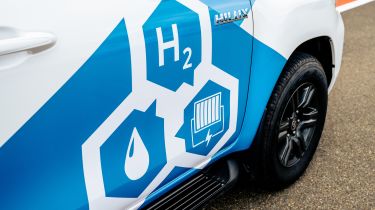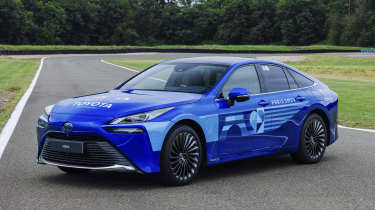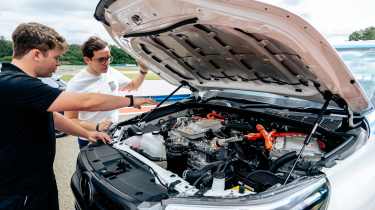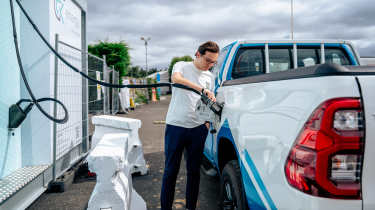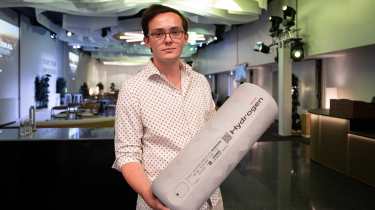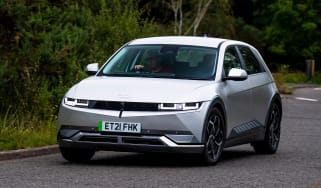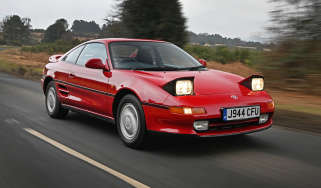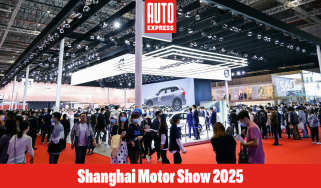Toyota’s hydrogen car plan: why there should be alternatives to battery electric cars
We take a deep dive into Toyota’s ‘multi-path’ strategy, which focuses on making hydrogen fuel-cell technology a viable alternative to battery EVs
Renewable electricity has been touted as the fuel choice of the future for a while. Although battery electric cars currently are expensive to buy, the reduced running costs and zero tailpipe emissions offered by electric powertrains make them an ideal choice as a sustainable replacement for ICE power.
But are battery electric vehicles (BEVs) the only solution to the complex issue of decarbonisation and sustainability? Electric powertrains certainly do have their drawbacks, resulting in several other fuel types being explored as viable alternatives to petrol and diesel power. These include liquid nitrogen and synthetic eFuels, but few are as promising as hydrogen – specifically hydrogen fuel-cell tech.
Japanese brand Toyota is perhaps one of the biggest supporters of what it dubs a ‘multi-path strategy’ – one that embraces the likes of hybrid and hydrogen-powered cars, alongside the pure-electric route that most of the industry is focusing on at the moment.
You might wonder then whether Toyota is spreading its R&D expertise too thin. Unlike most manufacturers that have rapidly electrified their line-ups, Toyota still only sells one EV in the UK, the bZ4X SUV, which is outclassed by many rivals in terms of overall range and practicality.
The car maker also offers the sleek-looking Toyota Mirai saloon. Plush and comfortable to the point it almost deserves a Lexus badge on the bonnet, the Mirai uses hydrogen fuel-cell technology. The model was on sale for a while in the UK, but it’s now only available on a ‘special order’ basis, due to limited demand.
Such a lukewarm reception is not surprising when you consider how expensive green hydrogen is to produce at the moment. That’s not to mention the required infrastructure, which just as with BEVs, needs significant investment in specialised refuelling facilities to make hydrogen vehicles a viable option for the general public. With only eight public hydrogen stations currently open in the UK, it’s no wonder that so few people here drive a hydrogen-powered car.
So why is Toyota, with its vast experience in electrified powertrains, pursuing what appears to be an unpopular and unprofitable source of power, while the rest of the industry continues to ride the current EV wave?
We posed this question to Toyota’s lead scientist, Gill Pratt, who explains that “the disparity in wealth and lack of infrastructure are major barriers” in terms of electrification. He adds: “This outlook underlines why we need to pursue every avenue at our disposal to reduce emissions using a range of technologies.”
That’s not to say hydrogen doesn’t have a place in more developed economies. Speak to anyone at Toyota and they explain that while electric powertrains certainly have their applications – mainly for general use in passenger cars – they don’t make much sense for industrial and heavy-goods vehicles.
To travel any considerable distance, BEVs require big, heavy batteries. These come at the expense of payload capacity, which is not ideal in vehicles that are designed for towing and hauling large quantities of goods or materials. There's the issue of range too, which will quickly come tumbling down whenever something weighty is placed in the boot or load bed.
This is where hydrogen fuel-cell technology comes into its own, because while a fuel cell weighs only slightly less than an EV battery, FCEVs need to carry around just 5-6kg of hydrogen gas in reinforced tanks to travel hundreds of miles at a time. That’s not to mention how much longer an electric vehicle takes to refuel compared with the hydrogen alternative, which can top up its tanks in a similar amount of time as a petrol or diesel car – and when speaking in industrial terms, time is money.
This has led to what Toyota’s head of fuel-cell business, Thiebault Paquet, has described as “long-term confidence” in Europe surrounding hydrogen technology. Last year, the EU signed legislation to facilitate and ensure the installation of hydrogen refuelling stations every 200km on major roads by 2031, with Toyota expecting Europe to be one of the world’s largest markets for fuel-cell vehicles by the end of the decade.
So why aren’t we seeing hydrogen refuelling stations popping up at every Welcome Break across the UK? Have we given up on the idea of hydrogen altogether? Not entirely, because although our hydrogen fuel-cell infrastructure is certainly not great, the government is instead investing and working with manufacturers, such as Toyota, to accelerate the arrival of FCEV commercial vehicles to the market.
Toyota received funding in 2022 from the UK Government via the Advanced Propulsion Centre (APC) to develop an FCEV variant of the brand’s iconic Hilux pick-up truck in Burnaston, Derbyshire. The project is still in its development phase, although a prototype was on display at this summer's Paris Olympics, with Toyota, an official partner of the games, handing us the keys so we could take it for a spin.
First we are guided round the vehicle by one of the project engineers, Barney Gardner. He tells us that “fitting the fuel cell within the Hilux’s short bonnet was very challenging”. To save cash, the Hilux uses the same running gear as the Mirai. Although, given the Mirai is much longer than the Hilux Extra Cab on which the FCEV prototype is based – this particular bodystyle was chosen due to its popularity in the UK – some compromises were needed.
That said, you wouldn’t know it at first glance. The Hilux FCEV gets a 180bhp electric motor on the rear axle, with three reinforced hydrogen tanks underneath the centre console and rear seats carrying up to 7.8kg of the gas. This equates to a range of around 373 miles, which is much further than what’s possible in the only all-electric pick-up truck currently on sale in the UK, the 220-mile Maxus T90 EV.
Before we hop into the FCEV, we drive both the standard diesel mild-hybrid Hilux and the Hilux BEV that's only available in Thailand. Toyota says the latter can only manage around a third of the distance on a single charge that the hydrogen fuel-cell model can cover. Despite being just a prototype, the Hilux FCEV appears to combine the smooth powertrain of the BEV, as well as the nimbleness and long range of the standard diesel truck. It's a real testament to the brilliant minds behind the project.
Other than a 3D-printed cut-off switch on the dashboard, there are very few clues that would make you think that the prototype is anything less than a vehicle that is ready to go on sale. Despite this, there are still some snags here and there that the team needs to address before the truck is given the green light for production.
"There are some features that we really want to add,” Gardner tells us. “Four-wheel drive is critical for a Hilux, so we’re looking at incorporating another electric motor on the front axle.” The ride height for the FCEV prototype is also slightly lower than the standard Hilux, while part of the loadbed is currently taken up by a small lithium-ion battery pack – something that will be relocated in the final version of the truck.
The success of such a small-scale project as this shows how manufacturers are ready and able to make the switch to hydrogen power for commercial vehicles. Toyota won’t give a date, but it’s evident the Hilux FCEV will be ready to go on sale within the next couple of years, although the question remains as to whether there will be the necessary demand (and that much-needed infrastructure) when the truck arrives.
In a bid to stimulate the industry, Toyota has shared the patents of the Mirai’s second-generation hydrogen fuel-cell powertrain – just as it did with the original Prius and its then-groundbreaking hybrid set-up. But Paquet says Toyota is already working on its third generation of FCEV technology, which could be ready as soon as 2026. This is expected to increase range by a further 20 per cent and cost as much as 37 per cent less than the second-generation tech.
“We are also working on developing complex- shaped tanks to allow ease of installation in various types of vehicles,” Paquet explains. Such a development could make it much easier to retrofit internal combustion-engined cars and trucks with hydrogen technology.
With BMW also working hard on developing hydrogen fuel-cell technology, but focusing its efforts on the upper echelons of the passenger vehicle market, it’s clear that the industry is softening towards Toyota’s multi-path solution.
Yet it’s up to governments to make it a reality. Hydrogen will never be a complete replacement for BEVs and Paquet reckons that even with an increase in the popularity of FCEVs, “battery electric vehicles will [still] occupy the most significant segment share by 2035”. However, without the same care and attention given to building infrastructure for BEVs, FCEVs may never carve their own niche, thus making the global transition to net zero all the more difficult.
Hydro-general use
Toyota’s vision for hydrogen power isn’t solely limited to vehicles. The brand believes that it could also be used to generate electricity on the go.
The firm has developed a portable hydrogen ‘cartridge’ that can store 1.8kWh of electricity and is designed to replace diesel generators. Weighing around five kilos, these can be easily swapped in and out and could be used to power anything from a sustainable coffee stand to a small motorcycle.
Are you looking for a zero-emissions car? Click here to discover the best electric cars on the market...
Find a car with the experts

